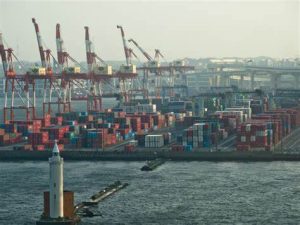
Umm Muhammed Umar
Two associations representing the meat industry have warned that South Africa has a food crisis in the making, as a result of the recent violent unrest in KwaZulu Natal, and the cybersecurity hack on Transnet’s IT system. This has left perishable food and animal feed languishing in the Durban port. The SA Meat Processors Association and the SA Association of Meat Importers and Exporters is calling on government for an urgent action plan. Radio Islam spoke to CEO, Paul Matthew, who says there are currently about 400 ‘reefer’ containers (refrigerated containers) holding raw meat and meat that is used for manufacturing. He said that having enough plug points to keep the containers cold was a huge challenge, “that’s the biggest challenge we’re having with Transnet, with all the devastation and the cyber-attack that hit the port, the fact that there has been no movement of food containers in the port, the fact there has been no more additional plug points available, and obviously there’s more containers actually coming in.” He added that as a result of the riots and the destruction of cold storages about 40 000 pellets bases have been lost in terms of cold storage. Matthew added, “our hands are tied, we cannot remove those containers because obviously food is regulated by agriculture department, and we have to follow a few steps before we can get containers out into wholesaling.” Matthew says the biggest problem is that there is nowhere to perform this function because they don’t have the containers. The Meat Associations are trying to get government to formulate a plan to get the containers into the Johannesburg area, so that a cold storage space could be accessed.
The logistics chain entails the Meat Associations importing products that are used in manufacturing of processed meats. Meat and poultry are also supplied to the wholesale industry. Matthew said, “it’s a perfect storm (if) you break the chain. If you look at a bridge, (if) the bridge is broken in the middle, we cannot get to the other side. So, it’s just going to be a huge snowball effect, where at the end of the day, people that need food in our country, especially those who eat a lot of viennas and polony and so on, are just not going to get food, because we can’t get the products into manufacturing.” This ‘perfect storm’ has put the whole logistics chain out of sync. Matthews says that it’s causing havoc as, if the containers are not moved and the extra plug points are lost, the freezers will lose the capacity to keep the product cold, and it will then have to be destroyed. A place will have to be found to dump and destroy the product. Matthew says this will be a huge loss to the population.
South Africa is facing a serious natural food shortage because of this disaster. If not resolved very soon, there will be repercussions. Matthew says government and the Agriculture Department, had been called upon to assist in moving the containers, or for an alternate plan to be made, but unfortunately, the call had fallen on deaf ears. He said, “so if we don’t get the product into the manufacturing environment, we already have manufacturing plants that closed their doors; they’ve stopped the production lines, people are now not working, you know, either they’re going to get retrenched, because the manufacturing guys do not have raw materials for the input.”
Matthew expects a food shortage in the near future, because of the problems at the port following the recent looting and destruction in the country. While the Meat Associations had been promised a response on Friday, when this interview took place, at roughly 4.30 pm on that same day, no response to the crisis had as yet been received.







0 Comments